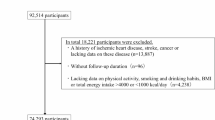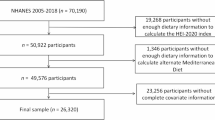Abstract
Background/objectives
Diet-induced acidosis is a determinant of gastrointestinal (GI) cancer susceptibility. However, the current evidence remains insufficient to establish a link between an acidogenic diet and cancer because the majority of previous studies were restricted to a case‒control design. We investigated whether the dietary acid load is involved in GI carcinogenicity.
Subjects/methods
We conducted a prospective cohort study of 10,741 participants who attended check-ups from October 2007 to December 2020 at the National Cancer Center, Korea. The participants were followed up until December 2020 to determine incident GI cancer cases. A Cox proportional hazards regression model was used to examine the dietary acid load, as reflected by the potential renal acid load (PRAL), the net endogenous acid production (NEAP), and net acid excretion (NAE), in relation to GI cancer risk.
Results
A total of 208 incident GI cancer cases were identified during the follow-up period. We observed a significantly increased GI cancer risk among male participants with high PRAL, NEAP, and NAE scores (hazard ratios (HRs) = 1.53 (95% confidence interval (CI): 1.05–2.22), 1.51 (1.04–2.19), and 1.73 (1.18–2.53), respectively). Importantly, acidogenic foods seem to have detrimental effects even in individuals who are not obese.
Conclusions
Our findings add substantial evidence to the argument that diet-dependent acid load plays certain roles in GI carcinogenesis, especially in males. Thus, attention should be given to the dietary acid‒base load for the prevention of GI cancer.
This is a preview of subscription content, access via your institution
Access options
Subscribe to this journal
Receive 12 print issues and online access
$259.00 per year
only $21.58 per issue
Buy this article
- Purchase on SpringerLink
- Instant access to the full article PDF.
USD 39.95
Prices may be subject to local taxes which are calculated during checkout

Similar content being viewed by others
Data availability
Data analyzed in this study are available from the corresponding author on reasonable request.
References
Hong MZ, Li JM, Chen ZJ, Lin XY, Pan JS, Gong LL. Global burden of major gastrointestinal cancers and its association with socioeconomics, 1990–2019. Front Oncol. 2022;12:942035.
Huang J, Lucero-Prisno DE, Zhang L, Xu W, Wong SH, Ng SC, et al. Updated epidemiology of gastrointestinal cancers in East Asia. Nat Rev Gstroentarol Hepatol. 2023;20:271–87.
Imbroisi Filho R, Ochioni AC, Esteves AM, Leandro JGB, Demaria TM, Sola-Penna M, et al. Western diet leads to aging-related tumorigenesis via activation of the inflammatory, UPR, and EMT pathways. Cell Death Dis. 2021;12:643.
Robey IF. Examining the relationship between diet-induced acidosis and cancer. Nutr Metab. 2012;9:72.
Carnauba RA, Baptistella AB, Paschoal V, Hübscher GH. Diet-induced low-grade metabolic acidosis and clinical outcomes: a review. Nutrients. 2017;9:538.
Lee KW, Shin D. Positive association between dietary acid load and future insulin resistance risk: findings from the Korean Genome and Epidemiology Study. Nutr J. 2020;19:137.
Osuna-Padilla IA, Leal-Escobar G, Garza-García CA, Rodríguez-Castellanos FE. Dietary acid load: mechanisms and evidence of its health repercussions. Nefrologia. 2019;39:343–54.
Passey C. Reducing the dietary acid load: how a more alkaline diet benefits patients with chronic kidney disease. J Ren Nutr. 2017;27:151–60.
Jafari Nasab S, Rafiee P, Bahrami A, Rezaeimanesh N, Rashidkhani B, Sohrab G, et al. Diet-dependent acid load and the risk of colorectal cancer and adenoma: a case–control study. Public Health Nutr. 2021;24:4474–81.
Herter J, Lederer AK, Ronco AL, Hannibal L, Huber R, Storz MA. Dietary acid load correlates with serum amino acid concentrations after a four-week intervention with vegan vs. meat-rich diets: a secondary data analysis. Nutrients. 2023;15:2942.
Ronco A, Martínez-López W, Calderón J, Mendoza B. Dietary acid load and colorectal cancer risk: a case-control study. World Cancer Res J. 2020;7:e1750.
Tran TT, Gunathilake M, Lee J, Oh JH, Chang HJ, Sohn DK, et al. The association of diet-dependent acid load with colorectal cancer risk: a case–control study in Korea. Br J Nutr. 2023;131:333–42.
Ronco A, Martínez-López W, Calderón J, Mendoza B, Storz MA. Dietary acid load and risk of gastric cancer: a case-control study. World Cancer Res J. 2022;9:e2403.
Ronco AL, Martínez-López W, Calderón JM, Golomar W. Dietary acid load and lung cancer risk: a case-control study in men. Cancer Treat Res Commun. 2021;28:100382.
Ronco A, Storz M, Martínez-López W, Calderon J, Golomar W. Dietary acid load and bladder cancer risk. An epidemiologic case-control study. Multidiscip Cancer Investig. 2022;15:3098.
Ronco AL, Martínez-López W, Calderón JM, Storz MA. Dietary acid load and risk of head and neck and oral cavity cancers: an epidemiologic study. Oral Sci Int. 2023;20:78–7.
Ronco AL, Martínez-López W, Calderón JM, Storz MA. Dietary acid load and esophageal cancer risk: a case-control study. Thoracic Cancer. 2022;13:2759–66.
Park Y-MM, Steck SE, Fung TT, Merchant AT, Elizabeth Hodgson M, Keller JA, et al. Higher diet-dependent acid load is associated with risk of breast cancer: findings from the sister study. Int J Cancer. 2019;144:1834–43.
Shi LW, Wu YL, Hu JJ, Yang PF, Sun WP, Gao J, et al. Dietary acid load and the risk of pancreatic cancer: a prospective cohort study. Cancer Epidemiol Biomark Prev. 2021;30:1009–19.
Wright ME, Michaud DS, Pietinen P, Taylor PR, Virtamo J, Albanes D. Estimated urine pH and bladder cancer risk in a cohort of male smokers (Finland). Cancer Causes Control. 2005;16:1117–23.
Ronco A, Martínez-López W, Calderon J, Golomar W, Storz M. Dietary acid load and risk of kidney cancer: an epidemiologic case-control study. World Cancer Res J. 2021;7:e1687.
Tabung FK, Brown LS, Fung TT. Dietary patterns and colorectal cancer risk: a review of 17 years of evidence (2000-2016). Curr Colorectal Cancer Rep. 2017;13:440–54.
Kim J. Cancer screenee cohort study of the National Cancer Center in South Korea. Epidemiol Health. 2014;36:e2014013.
Remer T, Manz F. Estimation of the renal net acid excretion by adults consuming diets containing variable amounts of protein. Am J Clin Nutr. 1994;59:1356–61.
Frassetto LA, Todd KM, Morris RC Jr, Sebastian A. Estimation of net endogenous noncarbonic acid production in humans from diet potassium and protein contents. Am J Clin Nutr. 1998;68:576–83.
Ahn Y, Kwon E, Shim JE, Park MK, Joo Y, Kimm K, et al. Validation and reproducibility of food frequency questionnaire for Korean genome epidemiologic study. Eur J Clin Nutr. 2007;61:1435–41.
Jun S, Lee J, Kim J. Association of dietary fiber intake with gastrointestinal tract cancer among Korean adults. JAMA Netw Open. 2023;6:e234680.
Willett W, Stampfer MJ. Total energy intake: implications for epidemiologic analyses. Am J Epidemiol. 1986;124:17–27.
Willett WC, Howe GR, Kushi LH. Adjustment for total energy intake in epidemiologic studies. Am J Clin Nutr. 1997;65:1220S–8S.
Storz MA, Ronco AL. Reduced dietary acid load in U.S. vegetarian adults: results from the National Health and Nutrition Examination Survey. Food Sci Nutr. 2022;10:2091–100.
Kahleova H, McCann J, Alwarith J, Rembert E, Tura A, Holubkov R, et al. A plant-based diet in overweight adults in a 16-week randomized clinical trial: the role of dietary acid load. Clin Nutr Espen. 2021;44:150–8.
Cosgrove K, Johnston CS. Examining the impact of adherence to a vegan diet on acid-base balance in healthy adults. Plant Foods Hum Nutr. 2017;72:308–13.
Keramati M, Kheirouri S, Musazadeh V, Alizadeh M. Association of high dietary acid load with the risk of cancer: a systematic review and meta-analysis of observational studies. Front Nutr. 2022:9:816797.
Izadi V, Farabad E, Azadbakht L. Serum adiponectin level and different kinds of cancer: a review of recent evidence. ISRN Oncol. 2012;2012:982769.
Hatami E, Abbasi K, Salehi-Sahlabadi A, Beigrezaei S, Bahrami A, Ghiasvand R, et al. Dietary acid load and risk of type 2 diabetes mellitus: a case-control study. Clin Nutr ESPEN. 2022;48:308–12.
Abshirini M, Bagheri F, Mahaki B, Siassi F, Koohdani F, Safabakhsh M, et al. The dietary acid load is higher in subjects with prediabetes who are at greater risk of diabetes: a case-control study. Diabetol Metab Syndr. 2019;11:52.
Park H, Cho S, Woo H, Park SK, Shin HR, Chang SH, et al. Fasting glucose and risk of colorectal cancer in the Korean Multi-center Cancer Cohort. PLoS ONE. 2017;12:e0188465.
Tran TT, Gunathilake M, Lee J, Kim J. Association between metabolic syndrome and its components and incident colorectal cancer in a prospective cohort study. Cancer. 2022;128:1230–41.
Tran TT, Lee J, Gunathilake M, Cho H, Kim J. Influence of fasting glucose level on gastric cancer incidence in a prospective cohort study. Cancer Epidemiol Biomark Prev. 2022;31:254–61.
Tran TT, Lee J, Gunathilake M, Kim J, Kim SY, Cho H, et al. A comparison of machine learning models and Cox proportional hazards models regarding their ability to predict the risk of gastrointestinal cancer based on metabolic syndrome and its components. Front Oncol. 2023;13:1049787.
Ronco AL, Storz MA. Dietary acid load and cancer risk: a review of the Uruguayan experience. Nutrients. 2023;15:3098.
Harris RC, Zhang MZ. The role of gender disparities in kidney injury. Ann Transl Med. 2020;8:514.
Worcester EM, Bergsland KJ, Gillen DL, Coe FL. Mechanism for higher urine pH in normal women compared with men. Am J Physiol Ren Physiol. 2018;314:F623–29.
Donohoe CL, O’Farrell NJ, Doyle SL, Reynolds JV. The role of obesity in gastrointestinal cancer: evidence and opinion. Therap Adv Gastroenterol. 2014;7:38–50.
Karczewski J, Begier-Krasińska B, Staszewski R, Popławska E, Gulczynska-Elhadi K, Dobrowolska A. Obesity and the risk of gastrointestinal cancers. Dig Dis Sci. 2019;64:2740–9.
Remer T, Dimitriou T, Manz F. Dietary potential renal acid load and renal net acid excretion in healthy, free-living children and adolescents. Am J Clin Nutr. 2003;77:1255–60.
Author information
Authors and Affiliations
Contributions
Formal analysis, TTT, JL; Preparation of original draft, TT.T.; Writing-review and editing, MG, JK; Data curation, JL, JK; Investigation, JL; Methodology, JL, JK; Funding acquisition, JK; Project administration, JK; Supervision, JK All authors have critically reviewed and approved the final version of the manuscript submitted for publication.
Corresponding author
Ethics declarations
Competing interests
The authors declare no competing interests.
Ethics approval and consent to participate
This research was performed in accordance with the Declaration of Helsinki. We obtained written informed consent from all participants and approval for the study protocol from the institutional review board of the National Cancer Center (No. NCCNCS-07-077).
Additional information
Publisher’s note Springer Nature remains neutral with regard to jurisdictional claims in published maps and institutional affiliations.
Supplementary information
Rights and permissions
Springer Nature or its licensor (e.g. a society or other partner) holds exclusive rights to this article under a publishing agreement with the author(s) or other rightsholder(s); author self-archiving of the accepted manuscript version of this article is solely governed by the terms of such publishing agreement and applicable law.
About this article
Cite this article
Thi Tran, T., Gunathilake, M., Lee, J. et al. The association of diet-dependent acid load with gastrointestinal cancer risk in the Cancer Screenee Cohort in Korea. Eur J Clin Nutr 79, 921–927 (2025). https://doi.org/10.1038/s41430-025-01612-2
Received:
Revised:
Accepted:
Published:
Version of record:
Issue date:
DOI: https://doi.org/10.1038/s41430-025-01612-2



